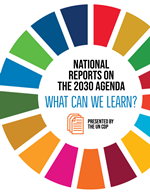Global Policy Watch
Published on Wed, 2022-03-16 18:37
Litmus test of international co-operation
One of the global processes falling prey to the Omicron variant of the Covid virus was the fifth UN Conference on the Least Developed countries, originally scheduled for the end of January in Doha, Qatar. It has been replaced with a meeting in New York on 17 March 2022 for the adoption of the Doha Programme of Action (DPoA); a full meeting will be held in March 2023, where governments will gather with stakeholders “to build new plans and partnerships for the delivery of the DPoA over the following decade”. The LDC conferences and programmes of action have a long history of marking the state of global solidarity with countries most in need of co-operation and of the underlying root-causes for global inequalities.
|
Published on Tue, 2022-02-01 14:58
Following the adoption of the 2030 Agenda for Sustainable Development, the United Nations Economic and Social Council (ECOSOC) embarked on an effort to harmonize UN Development System (UNDS) activities with the 2030 Agenda and its SDGs as well as system-wide pressure for greater country ownership of in-country activities. Part of this process includes the 2017 Quadrennial Comprehensive Policy Review (A/RES/71/243) and ongoing reform proposals for the UNDS, all aimed at improving the quality of development and meeting the needs and priorities of host countries and donor governments.
|
Published on Mon, 2021-11-22 19:26
Against the backdrop of COVID-19’s ongoing impact on economies and societies worldwide, the United Nations is bringing the lens of COVID-19 recovery to its High level meetings. September saw the launch of the UN Secretary-General’s ‘Our Common Agenda on 12 September’, the opening of the UN General Debate on 14 September and a series of High-level meetings ranging from sustainable development to nuclear disarmament.
|
Published on Tue, 2021-10-26 17:17
The UN General Assembly (UNGA) began its 76th session in September 2021 with a series of High-level meetings—in both hybrid and in-person formats—under the theme of 'Building Resilience through hope to recover from COVID-19, rebuild sustainably, respond to the needs of the planet, respect the rights of people, and revitalize the United Nations'. As the UN Decade of Action progresses, efforts to secure human, economic, and environmental health are vital. During the UNGA High-level week and throughout the month Member States focused on the need to create a more inclusive future and stronger global cooperation.
|
Published on Tue, 2021-08-24 14:33
With preparations underway for the Fifth United Nations Conference on the Least Developed Countries (LDC5) being held in 23-27 January 2022, the co-chairs of the Preparatory Committee (PrepCom), have convened two consultations with CSOs, one on 20 May and one on 28 July.
Introducing the second consultation, the co-chairs reiterated interest in CSO perspectives and participation throughout the LDC5 process:
|
Published on Mon, 2021-08-02 00:00
On 12 July, Social Watch co-organized together with the Secretariat of the Committee for Development Policy (CDP), the New School and Global Policy Forum, the HLPF side event “National Reports on the 2030 Agenda: What can we learn for a post-pandemic world?” to launch the CDP Background Paper "What did the 2020 Voluntary National Review (VNR) reports still not tell us?". CDP members presented key findings of their analysis of the 2020 VNRs, highlighting the disconnect between the ambition of the 2030 agenda and the attention given to the transformative policies in such areas as productive capacities, pandemic preparedness, inequalities and sustainable consumption and production.
|
Published on Thu, 2021-07-15 16:42
“We are in the midst of an unprecedented crisis. The severity of its impact is being felt globally. The LDCs are bearing its heaviest brunt. They have weak infrastructures, and a serious lack of capacity to cope with internal and external shocks.”
-- H.E. Rabab Fatima, Permanent Representative of Bangladesh and Co-chair of the Fifth UN Conference on LDCs (LDC5) Preparatory Committee
|
Published on Mon, 2021-07-12 11:30
The Committee for Development Policy (CDP) will discuss with Civil Society Reflection Group their key findings of its analysis of 2020 VNRs, highlighting the disconnect between the ambition of the agenda and the attention given to the transformative policies in such areas as productive capacities, pandemic preparedness, inequalities and sustainable consumption and production.
|
Published on Thu, 2021-07-08 12:37
Two days ago at the opening of the UN High-level Political Forum (HLPF) the head of the World Trade Organization (WTO), Ngozi Okonjo-Iweala, addressed the problem of inequalities-- inside households, within national economies and across different countries. Concerning “vaccine inequality”, she added that as of 1 July there had been 1.3 doses per 100 people in least developed countries (LDCs) compared with 83 doses per 100 people in developed countries.
|

|








